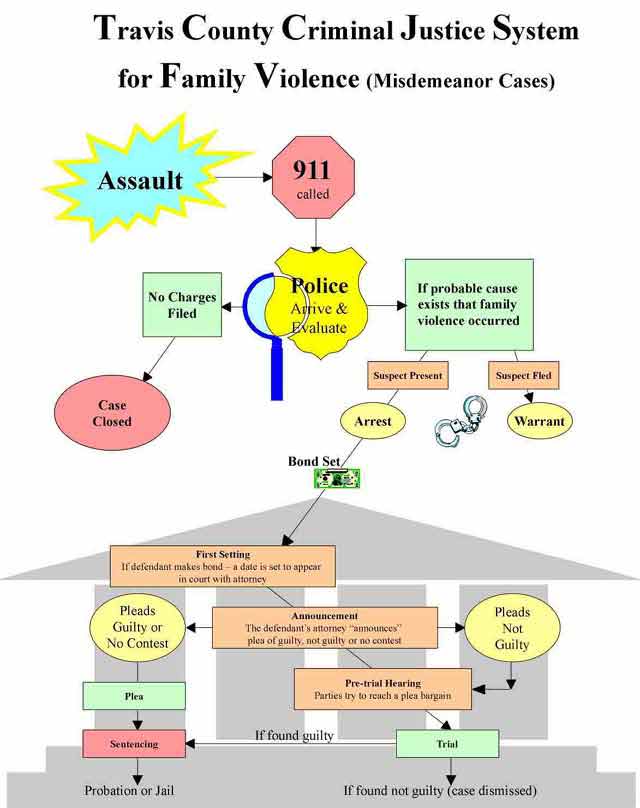|
Getting help in Austin, Texas |

FAMILY VIOLENCE What Happens When I Call 911?It is important that you tell the officer who comes out in response to the 911 call if you, your child, or any other household resident has been injured, or if you feel you are going to be in danger if the officer leaves.
STEP BY STEP 1. When you call 9-1-1 during or after an assault, you should tell the 9-1-1 operator what happened and where you are located. This is especially important if you are calling from a cell phone, because they will not be able to find you otherwise. Two police units will be dispatched to your location to find out what happened. If you change your mind about reporting the incident the officers will respond anyway and will need to check your welfare and write a report. They will also need to check the area for the person who assaulted you. If that person, the suspect, is still there, then he or she will be arrested if an assault with injury (Class A misdemeaner) or aggravated assault (3rd degree felony) has occurred. If the suspect is not there, then the officer will get information from you, including photographs of any injuries and a brief statement about what happened. The officer will write a report and it will be sent to the Family Violence Unit to be investigated by a detective. In either situation, you may request that a crisis team be dispatched so that you can talk with a Victim Services counselor on the scene. If the suspect is arrested you may request that an emergency protective order (EPO) application be filled out by the officer. 2. If the suspect is arrested at the scene then he or she will be taken to Travis County Jail. Depending on the charge he or she may only be in jail for a short period of time (sometimes less than one day). He or she will go before a judge to be magistrated (formally charged with the crime) and the judge will consider the EPO application at that time. The judge will also set bond, which is the amount of money required by the suspect to get out of jail. Bond is basically an agreement that the suspect will return for their court date. If the suspect meets certain criteria then he or she can get out on personal recognizance (PR bond). However, someone from the jail is supposed to contact you first to find out if you are afraid of him or her. If you are then you should not sign anything authorizing him or her to get out on a PR bond. That does not mean he or she can't get out of jail; it just means that they will have to come up with 10% of the bond money. Bond can be set for any amount, but is usually about $1500 for a first offense and as high as $10,000 or $20,000 for more serious or multiple offenses. If a person cannot pay the bond, then he or she is held in custody at Del Valle Correctional Facility until trial. The trial will usually occur within 1-3 months of the incident, but this can be delayed numerous times. 3. If the suspect was not arrested, then the case gets assigned to an APD or Travis County Sheriff's Office detective. This detective will read the officer's report, review the victim statement, and look at any physical evidence (photographs of injuries, weapons used, etc.) and determine if he/she has probable cause to go to a judge to get a warrant. If the detective does not have probable cause (a belief that the incident happened as stated in the report) then he/she will attempt to contact the victim via phone or mail to obtain a statement. At that time you can come to the Family Violence Protection Team to write out a complete statement of what happened. Regardless of whether an arrest was made or not, the assigned detective will always need a statement from you if the assault was aggravated. An aggravated assault exists if a weapon was used or exhibited during the assault or if the victim suffered serious bodily injury. 4. Once the detective has probable cause he or she can then go to a judge and request that a warrant be issued for the arrest of the suspect. After a warrant is issued officers from the fugitive unit will look for the suspect to arrest him or her. They will go to the suspect's last known address, workplace, or wherever else he or she may be found. If you have knowledge of where the person may be found, you can give that information to the detective or counselor assigned to your case. 5. Every Class A misdemeaner and all felony cases of family violence are also assigned to a Victim Services counselor. This counselor will try to contact you by phone or by visiting your home if you don't have a phone. It is helpful if you can provide the officer with a safe phone number where messages can be left for you, so that the counselor and detective can reach you. The counselor will give you updated information on the case and will offer services to you such as information, safety planning, crime victim's compensation details, and referrals for community services. The counselor will also make a report to Child Protective Services (CPS) if any children living in your home were injured or at risk of being injured as a result of the violence incident. This does not necessarily mean that CPS will send out an investigator, but it is a possibility. It is essential that you tell the officer or counselor the names, ages, and schools of all children residing in the household and where they were during the incident. 6. Even if no criminal violence has occurred, but you have called 9-1-1 because you are afraid it might occur if you don't get help, officers will still respond to the scene and write a report. You may still request a Victim Services counselor. Be sure to tell the officer if you are in fear for your safety if he or she leaves your location. Arrangements can be made to assist you in finding shelter for you and your children if needed.
Quiz: Should I stay or should I go? Legal Services Links: Social Services Links: Additional Resources: Domestic Violence Hotlines and Resources National Domestic Violence Hotline Violence Agaianst Men and Women Family Violence Awareness Page Child Abuse: National Clearinghouse on Child Abuse and Neglect Information National Data Archive on Child Abuse and Neglect
|
|||||||||||||||||||||||||||||||||||||||
